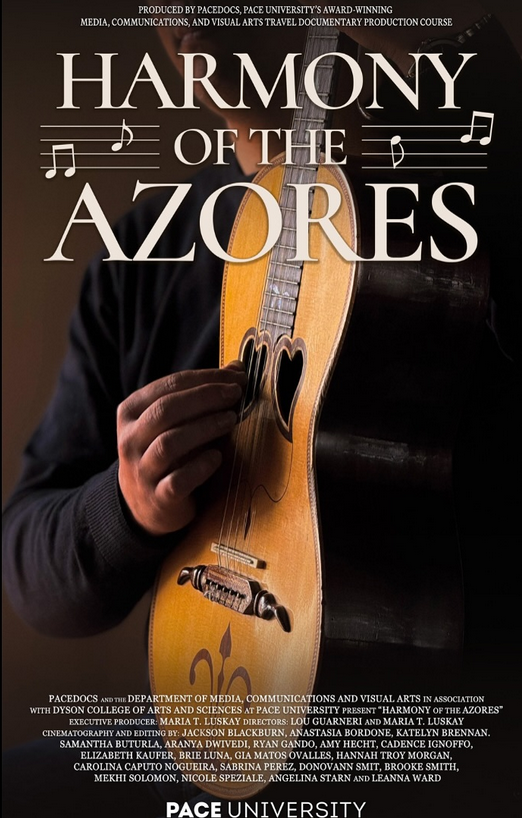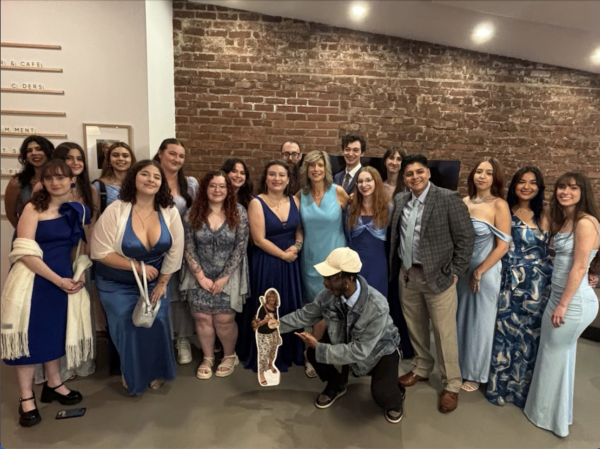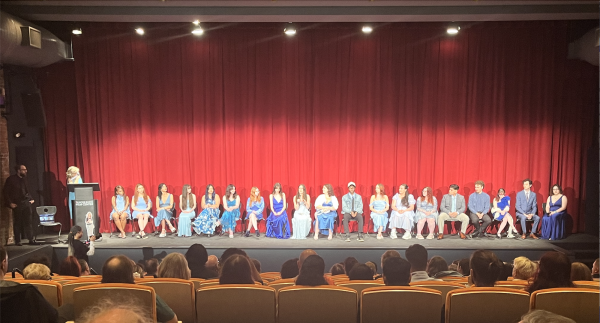
Official Poster for PaceDocs Documentary Harmony of The Azores(2024) Created by students of PaceDocs. Courtesy of PaceDocs/IG.
Monday, May 5, was the annual premiere for the MCVA department’s documentary. During spring break this semester, students in the Media Communications and Visual Arts (MCVA) department, joined by instructors Dr. Maria Luskay and Professor Lou Guarneri, went to the Azores Islands in Portugal to document a special musical instrument that the community holds dearly: the Viola de Terra (which translates to “guitar of the land/Earth”). Last year, members traveled to Andalusia in Spain, which is detailed here.
The documentary, titled Harmony of The Azores featured breathtaking cinematography of the Azores landscape, local villages, and interviews with members of the local music scene. They discussed what role the viola de terra played in their culture and history. There were also emotional performances given by various musicians each having their own distinct style and further insight on what the instrument meant to each and every one of them.

A Q&A session was held where audience members, who were made up of theater-goers, alumni students, and friends of the filmmakers, had the opportunity to ask questions about the filmmaking process.
How did you prepare prior to the trip? What was the planning process before you officially traveled to Portugal?
Jackson Blackburn: “It was a lot of Zoom meetings and itinerary scheduling; we had to get all the interview times set and ensure everything was booked. We also laid out a map for the story. The biggest challenge was knowing we didn’t know what would happen unless we got there. All of our planning could’ve been for nothing. Some stuff went according to plan, others not so much. It required a lot of flexibility. Expect the unexpected.“
How did prerequisite classes prepare you for filming the documentary? What lessons did you apply, and how will you carry them forward?
Kat Brennan: “Prerequisites are a little strange in the [MCVA] department. We’re able to branch out into everything, which means oftentimes, some classes can slip through the cracks. For me, it was editing; I learned how to do that on my first documentary,y which was a very interesting time; I credit this class with helping me find my passion because I fell in love with the documentary-style of editing. I never thought I would enjoy it, but I look forward to developing my skills.“
What were the biggest challenges faced in post-production?
Mekhi Solomon: “Figuring out pacing; it’s something a lot of people don’t think about, especially if you’re not in the field, but it matters a lot more than one thinks. Balancing the three acts and having a beginning, middle, and end to each of them makes us have to balance them out and ensure it’s not moving too fast or slow. It’s a matter of keeping the audience hooked.“
In terms of the final product, what part of the story did you feel that was conveyed the best?
Jackson Blackburn: “It was definitely the tradition and idea the community promoted, whether that was music, culture, or anything else. This is what our documentary was ultimately about, and we wanted to document these values as the whole program is built around the idea of learning more about cultures in our beautiful, diverse world.”

Harmony of The Azores will debut Monday, May 19, at 6:00 p.m. at Centro Cultural de Congressos de Angra do Heroísmo on Terceira Island.
It will be fascinating to see where the documentary will be filmed next year, whether that’s domestically or abroad. High praise has be given to each and every member of the project no matter what their role was or how significant it was.